
The Ten Manifestations Of Sattva
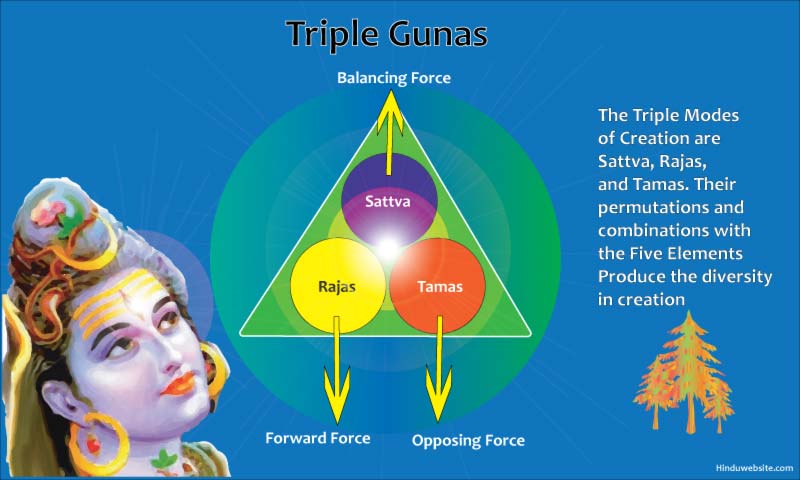
The Triple Gunas, Sattva, Rajas and Tamas
Sattva is one of the triple modes(gunas) of Nature mentioned in the Vedas. The other two are rajas and tamas. They determine our behavior, appearance, habits, desires, attitude, and our general disposition. Sattva means purity. It is a divine quality which manifests in you as physical vigor (varchas) and mental brilliance (medhas). Isvara, the Lord of the Universe, is made up of pure (suddha) sattva only. He is said to be Brahman's pure reflection in the sattva quality of Nature. Among the triple gods (trimurthis) of Hinduism, Vishnu represents sattva, Brahma represents rajas, and Shiva represents tamas. Sattva is necessary for liberation. The practice of yoga and spirituality results in the predominance of sattva. Our scriptures declare that those who possess it in higher quantities at the time of their death attain rebirth in pious families. All the deities and light beings of the higher worlds possess the predominance of sattva.
How do you know whether you are a sattvic person or whether anyone is a sattvic person? The following are the ten important qualities by which you can discern it.
Pleasantness (saumya)
Sattvic people are cheerful, gentle, pleasant and friendly. They are not easily disturbed. They radiate happiness and positive energy. Most of our gods have pleasant forms. At times, they may become angry and fierce (ugra). However, in them it is an affected quality, but not a weakness. The same is true with sattvic people. If they are angry it is for a purpose, but not because they are driven by passions and emotions. Other people are generally disturbed and hold grudges, whereas the sattvic types are the quiet opposite.
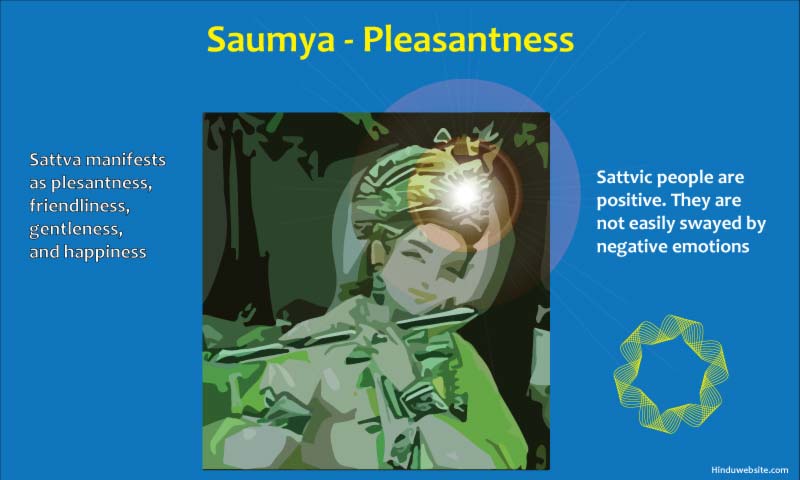
Virtue (sila)
Sattva manifests in us outwardly as virtuous behavior. Sattvic people are law abiding, follow the rules, respect traditions, avoid aggression, and abide by duty and morality. They stay away from evil and perverted people, practice their faith, believe in God, and contribute to social harmony, and the order and regularity of the world.
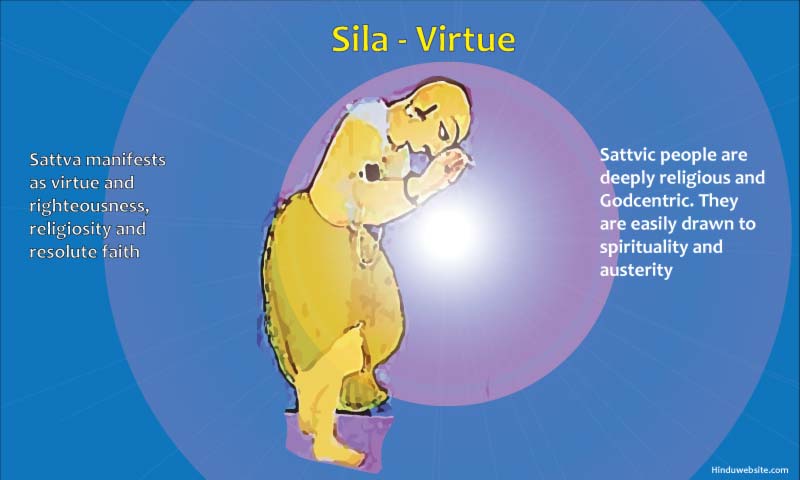
Compassion (karuna)
Sattvic people are harmless, nonaggressive, friendly, amiable, and nonviolent. By nature, they are helpful, considerate, accommodative, cooperative, and compassionate. They avoid hurting and harming others both physically and verbally. They extend the same attitude to the rest of creation. It is said that in the presence of truly sattivic and saintly people, even the most aggressive wild animals behave gently. In the Autobiography of a Yogi, Swami Yogananda mentioned the name of a spiritual master who reared a tiger that was not only vegetarian but used to utter Aum like sound whenever it growled.
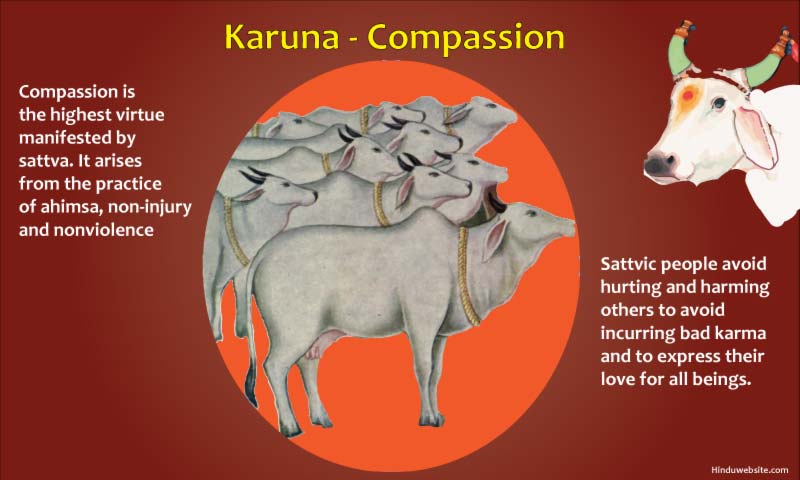
Truthfulness (satya)
Sat means truth, which is the nature of Supreme Brahman, in contrast to asat which is descriptive of the illusory nature of existence. The quality of sattva is therefore synonymous with truthfulness. Predominance of sattva makes the mind transparent whereby a person not only adheres to truth but also discerns truth. Truthfulness is not just about speaking truth but also about being honest with yourself, truthful in your words and deeds, keeping your promises, having the courage to speak truth, and recognizing the truth that is hidden in the nature of things. Sattva gives you the ability and the wisdom to discern truth because from sattva arises the mental brilliance and pure intelligence (buddhi), which enables you to distinguish truth from falsehood and the good from evil. Sattvic people are good decision makers because they are free from confusion and perversion of the mind.
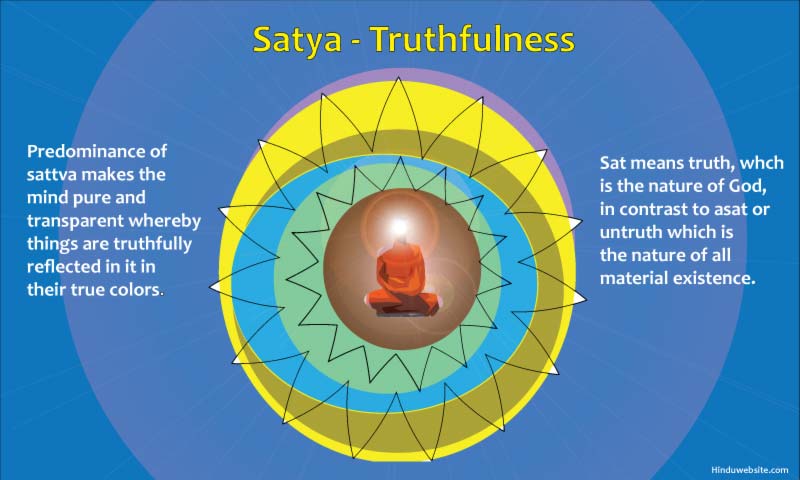
Non-covetousness (asteya)
People in worldly life are driven by either fear or greed or both. Sattvic people live contended lives. They are happy with what they have, whether they are rich or poor, and whether they have problems or not. Sattvic people do not take what does not belong to them. They do not take credit for the work done by others. They do not steal information or wealth from others, unless it is given to them. The scriptures state that those who take from others what does not truly belong to them, be it wealth, knowledge, or information, incur very bad karma that will last for several life times. Unfortunately, there are some websites and magazines that are run in the name of our Samskriti and culture by people who have no scruples and hesitation in stealing information from others and posting them on their websites.
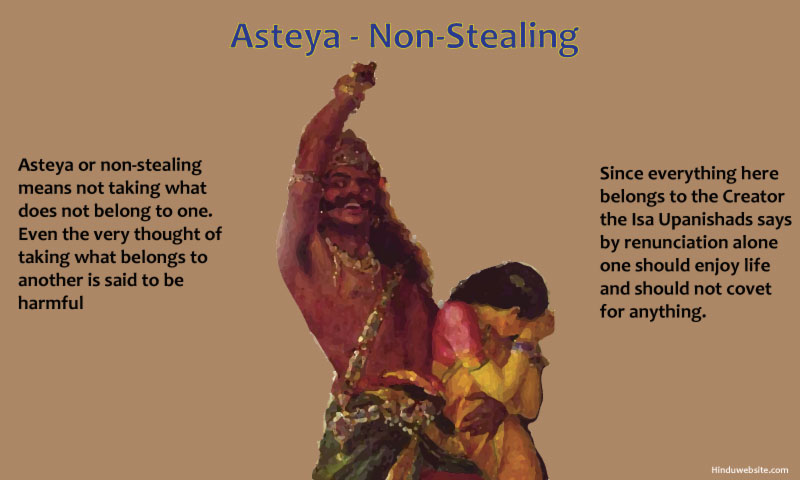
Discerning Wisdom (Buddhi)
Wisdom is a function of intelligence. Discerning intelligence in Sanskrit is known as Buddhi, or the higher intelligence. It is the ability to know the right from the wrong. Sattvic people possess wisdom. They learn from their mistakes and avoid repeating them. Since they possess discriminating knowledge, they know how to discern truth from falsehood. A sattvic mind can perceive truth without distortions and delusion. Hence, they perceive the world better than others and are not easily fooled by outward appearances.

Pleasure
Sattvic people are motivated by the desire for pleasure, comfort, and happiness. Hence, sometimes you see them succumbing to the temptations of sexual pleasures and the luxuries of life. Because of the predominance of sattva, even spiritual masters and teachers often succumb to sensuality and physical temptations. It is because Nature acts through them. So is the case with gods like Indra, Agni, and Soma who are by nature pleasure loving deities. Our scriptures suggest that one may enjoy the riches and comforts of life without coveting them and clinging to them. You have a right to enjoy life in the name of God, but not otherwise.

Detachment
Detachment means freedom from desires, and living and acting like Brahman in the pursuit of liberation, without ignoring your duties and responsibilities. Brahman has no agenda. He has neither interest nor disinterest in anything. He is complete and perfect (purnam). He does what is necessary for the order and regularity of the worlds, without becoming involved with them. Sattvic people engage in actions without desires. They accept what life offers to them with attachment and without judgment. They let life happen as destined by Brahman, without trying to take control of it. This is the true brahmacharya.
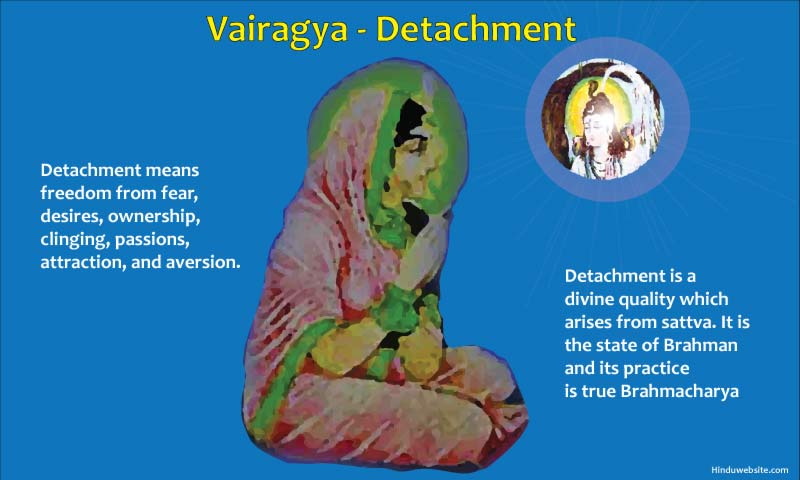
Stability (sthitaprajna)
The purpose of yoga is to become mentally and physically stable by developing the ability to endure pain and suffering. It is meant to be done by increasing the predominance of sattva so that the mind can be freed from modifications and afflictions and stabilized in the contemplation of God or the Self. The predominance of sattva leads to increased power of concentration and mental stability, as the mind is freed from impurities and modifications. Sattvic people have a transparent mind in which truth is reflected without distortion. Since they are also free from the dualities and pairs of opposites, their minds are easily stabilized.
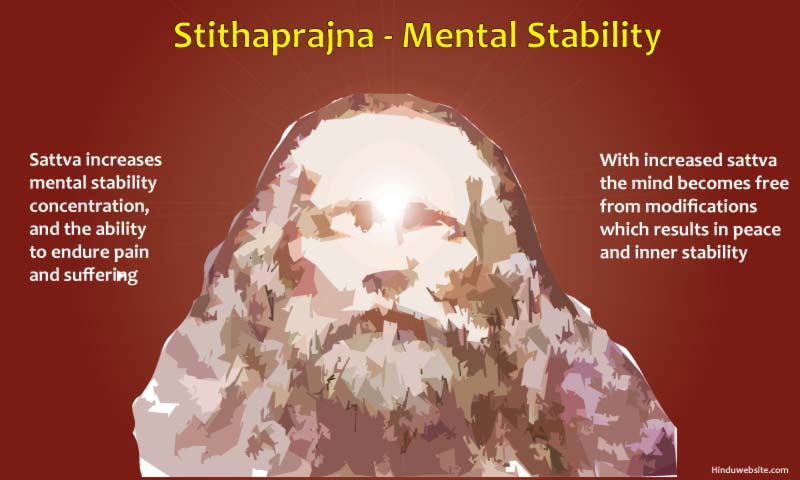
Equanimity (samatvam)
Sameness means accepting life as it is, without conditions and expectations. It means freedom from attraction and aversion, and embracing both the pairs of opposites, such as heat and cold, with the same attitude. Ordinary people experience pain and pleasure according to their desires. If conditions are favorable, they are happy, but if otherwise you can see them unhappy. It is not so with sattvic people. In case of sattvic people, their happiness and mental disposition arises from within, and they remain the same in all conditions and situations.
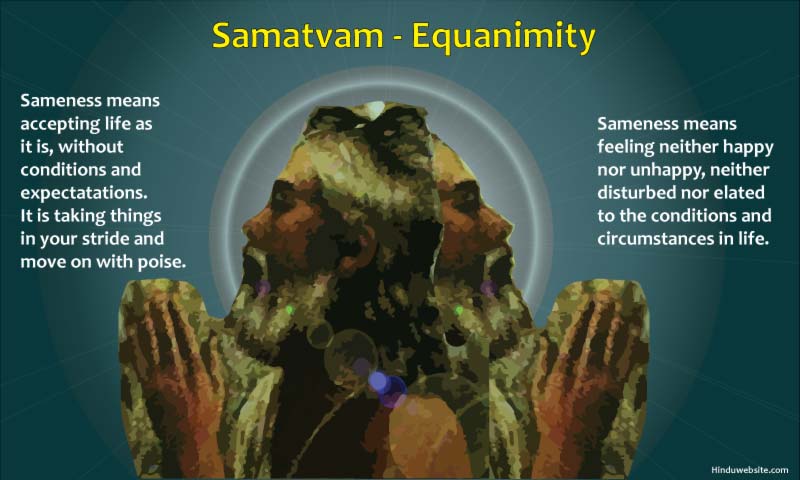
Conclusion
In the Chapter 16 of the Bhagavadgita, you will find several divine qualities that arise from sattva. They are, fearlessness, predominance of sattva, yoga of knowledge, charity, self-restraint, study of scriptures, austerity and simplicity, non-injury, truthfulness, freedom from anger, self-sacrificing nature, peaceful, non-slandering, compassion non-covetousness, gentleness, modesty, unwaveringness, vigor, forgiveness, fortitude, cleanliness, freedom from treachery, and absence of self-importance. Today we live in very turbulent world, where breaking the laws, perversion, promiscuity, violence, intimidation, cheating, deceiving, and lying have become socially, politically and morally acceptable and applaudable. Movies about criminals, psychopaths, serial killers, rapists, zombies and vampires attract more people to movie theaters rather than movies made with sattvic themes about good people. If you are a righteous person who can discern truth in the midst of falsehood, you are bound to feel the extent of darkness that has spread in the world. People are currently guided by vague impressions rather than clear knowledge, and by prejudice rather than truth, since many have lost the wisdom to discern the right from wrong, and believe as true what they want to project as truth. If you do not have the discernment, you will surrender to the passions of your life and let yourself drown in a dark and tamasic world. You will be deceived repeatedly by the leaders you elect, the products you choose, and the institutions you support. It is therefore important to cultivate sattva and work for your moral and spiritual wellbeing.
Suggestions for Further Reading
- The Symbolism of Snakes and Serpents in Hinduism
- Ten Distinguishing Features Of Hinduism
- Ten Reasons Why You Should Worship Shiva
- The River Sutra - Lessons From the River
- The Ten Main Duties (dharmas) in Hinduism
- The Ten Manifestations Of Sattva in Hinduism
- The 12 Manifestations of Brahman, the Supreme God of Hinduism
- Ten Teachings of the Buddha From the Dhammapada
- The Meaning And Significance Of Swastika In Hinduism
- What is Prana? The Five Types of Breath
- Hinduism and the God of Death
- Om, Aum, Pranava or Nada in Mantra and Yoga Traditions
- Wealth and Duty in Hinduism
- Hindu Gods - Lord Ganesha
- Symbolism and Significance of the Descent Of Ganga
- Symbolism of Ganga As the Purifier and Liberator
- The Meaning and Significance of Heart in Hinduism
- The Origin and Significance of the Epic Mahabharata
- Yin and Yang, and the Hindu Connection
- Symbolism in the Story of Sagar Manthan, the Churning of The Ocean
- The Symbolic Significance of Puja Or Worship In Hinduism
- Essays On Dharma
- Esoteric Mystic Hinduism
- Introduction to Hinduism
- Hindu Way of Life
- Essays On Karma
- Hindu Rites and Rituals
- The Origin of The Sanskrit Language
- Symbolism in Hinduism
- Essays on The Upanishads
- Concepts of Hinduism
- Essays on Atman
- Hindu Festivals
- Spiritual Practice
- Right Living
- Yoga of Sorrow
- Happiness
- Mental Health
- Concepts of Buddhism
- General Essays
Image Credits: The images used in this articles are either in public domain or licensed under various Creative Commons Attribution-Share Alike Generic licenses by Wikipedia, Himalayan Academy Publications and Wikimedia. This article is copyright Hinduwebsite.com and should not be reproduced in any format without prior written permission.